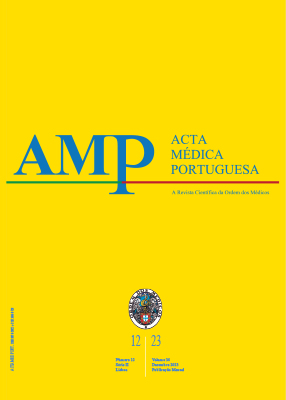Requests, Issuing, and Hospital Admissions Regarding Mental Health Warrants Before and During the COVID-19 Pandemic in a Region in Portugal
DOI:
https://doi.org/10.20344/amp.19761Keywords:
COVID-19, Hospitalization, Portugal, Psychiatric Department, HospitalAbstract
Introduction: Mental health warrants exist in most countries and are issued when patients have severe mental illness, refuse treatment, and present a serious risk to themselves or others. We describe the epidemiology of mental health warrant requests received, and warrants issued by a Public Health Unit in a Portuguese region, as well as subsequent hospital admissions before and during the COVID-19 pandemic.
Methods: We used routine administrative data of mental health warrant request entries from a Public Health Unit serving a population of 219 739 individuals and compared the average of monthly requests, issued warrants, and hospital admissions during two separate periods (January 2013 to January 2021 and February 2021 to October 2022) as well as the proportion of warrants issued, hospital admissions among requests, and other patient characteristics. We identified factors associated with hospital admissions among the requests using logistic regression.
Results: Monthly average warrant requests, issued warrants and hospital admissions increased after February 2021 (x̄ 2.87 vs 7.09 p < 0.001; x̄ 2.67 vs 6.42 p < 0.001; x̄ 1.55 vs 3.58 p < 0.001). We found no differences by period in the proportion of requests with issued warrants (92.8% vs 90.6% p = 0.42) nor the proportion of requests with subsequent hospital admissions (54.0% vs 49.0% p = 0.33). In the second period, there were differences in the proportion of patients with a previously diagnosed mental health disorder (95.3% vs 90.4% p = 0.049). There were significant differences in the distribution of the origin of requests. Being unemployed (OR:2.5 CI:1.2 - 5.2), not having completed high school (OR:2.01 CI:1.12 - 3.77) and having university education (OR:3.67 CI:1.27 - 10.57) degree were associated with hospital admission.
Conclusion: Severe mental illness with criteria for mental health warrants may require more resources and different approaches due to a possible increase during and after the COVID-19 pandemic. Community based mental healthcare, incentivized follow-up by primary care and ambulatory treatment may be considered. Further research should evaluate both the national and international trends and associated factors.
Downloads
References
Saya A, Brugnoli C, Piazzi G, Liberato D, Di Ciaccia G, Niolu C, et al. Criteria, procedures, and future prospects of involuntary treatment in psychiatry around the world: a narrative review. Front Psychiatry. 2019;10:271. DOI: https://doi.org/10.3389/fpsyt.2019.00271
da Silva DG. Mandados de condução à urgência de psiquiatria em imigrantes.2017. [cited 2023 Jan 24]. Available from: https://run.unl.pt/handle/10362/31124.
Davies M, Hogarth L. The effect of COVID-19 lockdown on psychiatric admissions: role of gender. BJPsych Open. 2021;7:e112. DOI: https://doi.org/10.1192/bjo.2021.927
Boldrini T, Girardi P, Clerici M, Conca A, Creati C, Di Cicilia G, et al. Consequences of the COVID-19 pandemic on admissions to general hospital psychiatric wards in Italy: reduced psychiatric hospitalizations and increased suicidality. Prog Neuropsychopharmacol Biol Psychiatry. 2021;110:110304. DOI: https://doi.org/10.1016/j.pnpbp.2021.110304
Penninx BW, Benros ME, Klein RS, Vinkers CH. How COVID-19 shaped mental health: from infection to pandemic effects. Nat Med. 2022;28:2027-37. DOI: https://doi.org/10.1038/s41591-022-02028-2
Harrison PJ, Taquet M, Harrison P. Neuropsychiatric disorders following SARS-CoV-2 infection. Brain. 2023;146:2241-7. DOI: https://doi.org/10.1093/brain/awad008
Loch AA, Mota NB, Rössler W, Gattaz WF. Exacerbation of psychosis risk during the COVID-19 pandemic: the disproportionate impact on the lower income population. Psychiatry Res. 2022;307:114319. DOI: https://doi.org/10.1016/j.psychres.2021.114319
Balestrieri M, Rucci P, Amendola D, Bonizzoni M, Cerveri G, Colli C, et al. Emergency psychiatric consultations during and after the COVID-19 lockdown in Italy. A multicentre study. Front Psychiatry. 2021;12:697058. DOI: https://doi.org/10.3389/fpsyt.2021.697058
Bodini L, Bonetto C, Maccagnani A, Bonora A, Polati E, Ricci G, et al. Changes in emergency psychiatric consultations in time of COVID-19: a retrospective observational study in the Verona Academic Hospital over the two pandemic years 2020–2021. BMC Emerg Med. 2023;23:1-9. DOI: https://doi.org/10.1186/s12873-023-00788-9
Koziarski J. The effect of the COVID-19 pandemic on mental health calls for police service. Crime Sci. 2021;10:1-7. DOI: https://doi.org/10.1186/s40163-021-00157-6
Dionisie V, Ciobanu AM, Moisa E, Manea MC, Puiu MG. The impact of the COVID-19 pandemic on inpatient admissions for psychotic and affective disorders: the experience of a large psychiatric teaching hospital in Romania. Healthcare. 2022;10:1570. DOI: https://doi.org/10.3390/healthcare10081570
af Ugglas B, Djärv T, Ljungman PL, Holzmann MJ. Association between hospital bed occupancy and outcomes in emergency care: a cohort study in Stockholm Region, Sweden, 2012 to 2016. Ann Emerg Med. 2020;76:179-90. DOI: https://doi.org/10.1016/j.annemergmed.2019.11.009
Assembleia da República Portuguesa. Proposta de Lei 24/XV/1 Aprova a Lei de Saúde Mental e altera legislação conexa. [cited 2023 Jan 24]. Available from: https://www.parlamento.pt/ActividadeParlamentar/Paginas/DetalheIniciativa.aspx?BID=141788.
Martinho SM, Santa-Rosa B, Silvestre M. Where the public health principles meet the individual: a framework for the ethics of compulsory outpatient treatment in psychiatry. BMC Med Ethics. 2022;23:1-9. DOI: https://doi.org/10.1186/s12910-022-00814-8
Kobau R, Seligman ME, Peterson C, Diener E, Zack MM, Chapman D, et al. Mental health promotion in public health: perspectives and strategies from positive psychology. Am J Public Health. 2011;101:e1. DOI: https://doi.org/10.2105/AJPH.2010.300083
Portugal. Decree-Law nr. 82/2019. Official Gazette, I Series, nr. 65 (2009/04/02). p.2062-5.
Downloads
Published
How to Cite
Issue
Section
License
Copyright (c) 2023 Acta Médica Portuguesa

This work is licensed under a Creative Commons Attribution-NonCommercial 4.0 International License.
All the articles published in the AMP are open access and comply with the requirements of funding agencies or academic institutions. The AMP is governed by the terms of the Creative Commons ‘Attribution – Non-Commercial Use - (CC-BY-NC)’ license, regarding the use by third parties.
It is the author’s responsibility to obtain approval for the reproduction of figures, tables, etc. from other publications.
Upon acceptance of an article for publication, the authors will be asked to complete the ICMJE “Copyright Liability and Copyright Sharing Statement “(http://www.actamedicaportuguesa.com/info/AMP-NormasPublicacao.pdf) and the “Declaration of Potential Conflicts of Interest” (http:// www.icmje.org/conflicts-of-interest). An e-mail will be sent to the corresponding author to acknowledge receipt of the manuscript.
After publication, the authors are authorised to make their articles available in repositories of their institutions of origin, as long as they always mention where they were published and according to the Creative Commons license.









